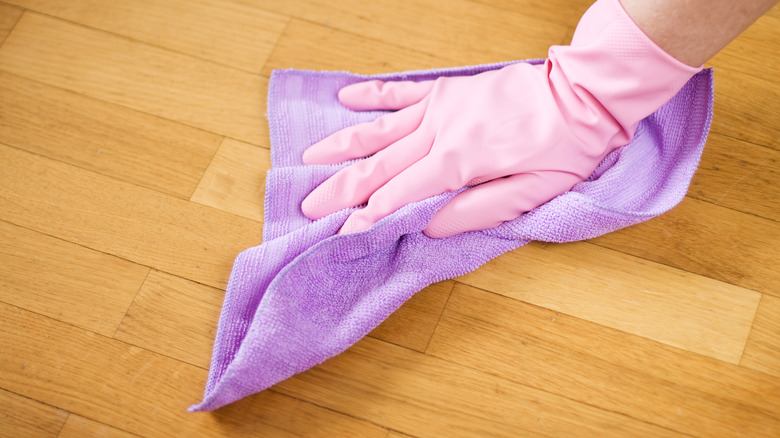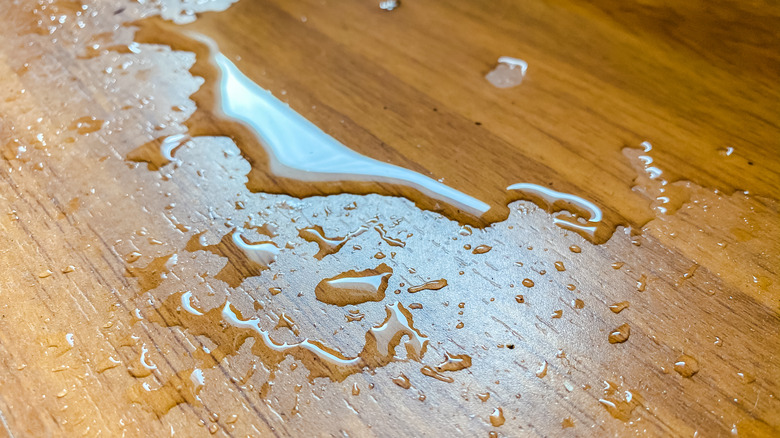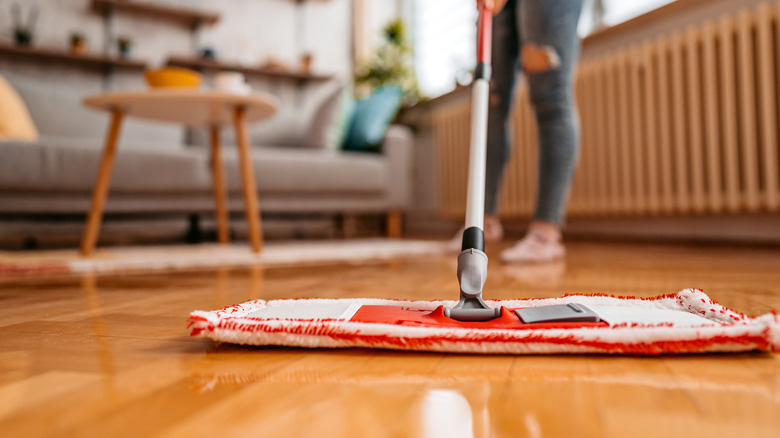The Common Cleaning Agent You Shouldn't Use On Finished Hardwood Floors
Among the many household cleaner options, rubbing alcohol is a common cleaning agent that is both readily available and affordable. It's touted for being highly effective at killing bacteria, viruses, and fungi, making it a great option for disinfecting a variety of surfaces and objects in your home. From cleaning electronics to cleaning surfaces like glass or metal, rubbing alcohol is a powerful cleaner without the harsh chemicals or risk of damage to these surfaces. It's no wonder that it's so popular as a go-to cleaning agent. All of that being said, though, you'll definitely want to turn to alternative solutions when you're cleaning your hardwood floors.
Isopropyl alcohol, or rubbing alcohol as it's commonly referred to, is great at removing dirt and grime, but it's so powerful that it can also damage your finished hardwood flooring. With repeated use, this solvent can dissolve the finish on your floors, removing the protecting coating, and ultimately leaving them vulnerable to scratches, moisture, and other damage. At the same time, rubbing alcohol may also strip away any natural oils in the wood which can cause the floors to dry out and become more prone to cracking or warping over time, necessitating costly repairs or maintenance that could have otherwise been avoided. In this way, skip the rubbing alcohol next time you clean your floors and turn to wood-specific cleaners or more gentle options to help maintain the protective coating and structural integrity of your hardwood floors.
What to do if you get rubbing alcohol on your wood floors
Accidents happen and, at some point, you may encounter a spill of rubbing alcohol on your hardwood floors. In the event that this occurs, prompt action is important to avoid extensive damage to your wood. Once you've noticed a spill, quickly use a clean cloth or paper towel to absorb the liquid. Try not to let it spread far on the floor and gently blot the affected areas rather than rubbing or spreading with a cloth or towel. Blotting will help to absorb the alcohol without introducing it to unaffected areas.
Once you've absorbed the spill, you can dilute the remaining surface residue with water. Dampen a clean cloth or sponge with clean water and continue to blot the affected area. Like before, avoid rubbing as you may inadvertently strip away the polish from the flooring. Continue this process until the alcohol is thoroughly diluted and removed. Then be sure to dry the area completely using a clean dry cloth. You can also turn on fans and open windows to help expedite the drying process.
After it dries completely, assess the floors for any damage. Look for discoloration or damage to the finish. If there's any slight damage, you can use a hardwood floor cleaner or polish to help restore the appearance of this area. For more widespread damage, it's a good idea to contact a hardwood flooring company to assist with repairs.
Clean your floors with dish soap
Save your rubbing alcohol for minor cuts or abrasions, and consider an affordable and natural alternative that you can use to clean your hardwood floors without the risk of harsh chemicals from commercial cleaners that may inadvertently strip away any protective or aesthetic finishes on your flooring. One great alternative is to simply use mild dish soap and water. Dish soap is reliable and effective in breaking down dirt and grime and can be safely applied to your hardwood floors.
To try this method, dilute a small amount of dish soap in a bucket of warm water. 2 tablespoons of soap per gallon of water should do the trick. Mix the solution well until the soap is fully dissolved. Using a mop or microfiber cloth, dip your tool in the soap water. Shake off excess moisture or wring out your cleaner so that it's only damp and not sopping wet as excessive moisture can also damage your hardwood floors. Proceed to mop or wipe your floors, working in small sections at a time. Gentle, circular motions will help to lift away dirt and stains without scratching or damaging the surface. Once you've finished, use a clean, damp mop or cloth to remove any soapy residue, and then dry the floors thoroughly with a soft towel to prevent any damage or streaking. This method is a great alternative that will help preserve the shine and integrity of your hardwood floors.


